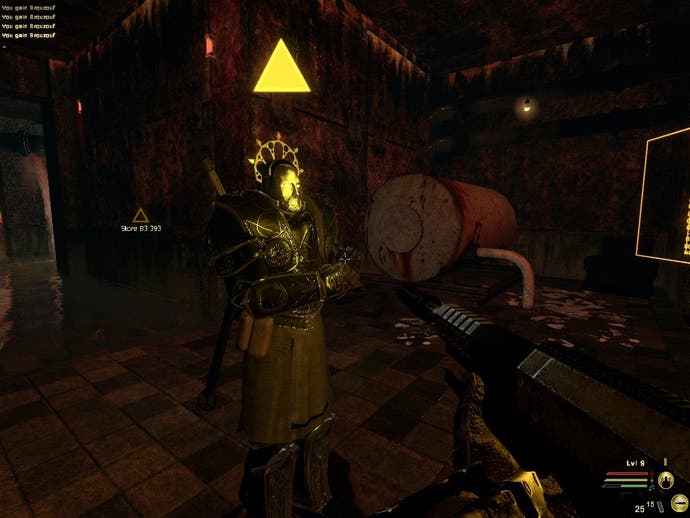E.Y.E: Divine Cybermancy
A moment of clarity.
The inspiration for this indie RPG/FPS hybrid, developed by the 10-strong team at Streum On Studio, is clearly Deus Ex. Not only does it take place in a cyberpunk setting, but it also offers a dizzying amount of player choice. Bionic implants, psychic powers, multiple approaches to every mission - Ion Storm Austin's seminal genre mashup is a comparison as obvious as it is accurate. Yet, after soaking in Divine Cybermancy's strange brew for several weeks, that's not what the game reminds me of most.
Just over 12 years ago, I worked for the publisher of a magazine about the paranormal, a subject that resulted in a particularly entertaining postbag. In amongst the credulous UFO sightings and half-baked ghost encounters there was one piece of mail that still sticks with me today.
It was an incredibly detailed diagram, drawn in felt tip pen, on the back of a dog-eared TV Times poster. The diagram, and all its footnotes and captions, covered almost the entire space. Sweeping circles of blue ink, looping around and back into themselves, divided up into tiny sub-sections, each with a date and scrawled note.
According to what we could decipher of the tiny spidery handwritten explanation, it depicted the orbit of Planet X, a heavenly body that the government had kept secret for centuries, and how its movement across the sky coincided with key moments in Earth's history. Moments such as "1978 - poison gas first introduced into prison cells (UK)". It was hilarious, and also deeply terrifying. This wasn't just random weirdness, it was a life's work. To the man who created this dense paranoid scribble, it was crystal clear.
Though I won't go so far as to accuse the developers of being paranoid lunatics, E.Y.E: Divine Cybermancy reminds me, more than anything, of that diagram.

This is a game that is virtually impenetrable. Its storyline is opaque to the point of ridiculousness, while its gameplay mechanics are buried deep beneath a user interface so clumsy and unintuitive that it could take months to work out what everything does. As with the cosmic mystery of Planet X, I stare at Divine Cybermancy's inscrutable sprawl and know that, if nothing else, it at least makes perfect sense to the people who made it.
You install the game, load it up and then sit back as it vomits great lumpy chunks of exposition at your face. You're a psychic cyborg knight of some kind, and there's something called the Secreta Secretorum and E.Y.E is either a place or an organisation or possibly a person, and there are factions called Culters and Jians and Orus and a planet called XechPrimus and the Croon Incident (this was bad, I gather) and the Meta-streumonic Force which might be the bad guys, or not.
There's almost no voice acting in the game, so all of this is served up in tiny font text boxes. If dialogue doesn't sate your appetite for convoluted backstory, there's a whole library in the game full of this stuff. There's a website with even more, should you want it. And none of it makes sense. It's like you've walked in halfway through a seven-hour lecture on the intricate details of somebody's fan fiction universe and have to fill in the bits you've missed while taking on board ever larger dollops of new information at the same time.
This sense of bewilderment and confusion could be charming, if it wasn't echoed in the gameplay itself. This is a game with myriad features, almost none of which are adequately explained.

One of the first obstacles you face in the game is a high ledge. "Press T for the CyberJump Tutorial" prompts the game. Pressing T actually brings up a lengthy menu of video tutorials, none of which are called CyberJump. Eventually you'll work out that it wants you to watch the Action Menu tutorial, after which you learn to press C, then drag the icon you want into a slot, then activate the ability. Only then can you clear this fiendish high ledge and proceed.
Even the simplest things have been made slightly awkward. Collecting ammo means looking down at it and pressing the Use key. Climbing a ladder means standing in just the right spot and pressing the Use key. Simple actions that a game should automatically take care of are left for the player to handle. It's not laborious in itself, but over time it clumps together and lends the game a gluey, sluggish air.

